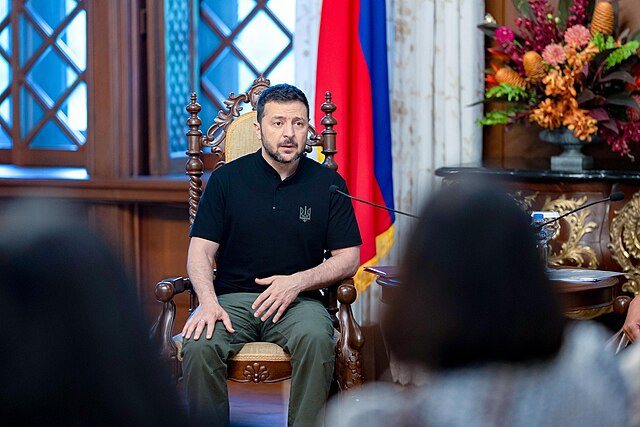Ukrainian President Volodymyr Zelensky said Tuesday that he is prepared to negotiate an end to the war with Russia and work under President Donald Trump's "strong leadership" to achieve a lasting peace. The announcement came just days after Trump suspended all U.S. military aid to Ukraine, a move that drew praise from Moscow and alarm from European allies.
"I would like to reiterate Ukraine's commitment to peace," Zelensky wrote on X. "None of us wants an endless war. Ukraine is ready to come to the negotiating table as soon as possible to bring lasting peace closer."
The proposal, which Zelensky outlined publicly, includes an initial phase that would focus on a prisoner exchange and a "truce in the air" that would ban missile and drone strikes on civilian infrastructure. He also suggested expanding the ceasefire to the sea, provided that Russia reciprocates.
Zelensky's statement followed a contentious Oval Office meeting with Trump and Vice President JD Vance on Friday, during which the U.S. president reportedly berated him for "gambling with World War Three" and suggested that Ukraine was in "big trouble" if it did not make concessions. A planned agreement that would have given U.S. companies access to Ukraine's mineral resources was left unsigned after the heated exchange.
"Regarding the agreement on minerals and security, Ukraine is ready to sign it in any time and in any convenient format," Zelensky said, signaling his willingness to move forward despite the dispute. "We see this agreement as a step toward greater security and solid security guarantees."
The Trump administration's suspension of military aid, which includes ammunition, armored vehicles, and artillery shells, has already begun to impact Ukraine's battlefield readiness. A White House official said Monday that the aid will not resume until Trump is convinced that Zelensky is committed to peace talks with Russia.
The move has been welcomed by the Kremlin, with spokesperson Dmitry Peskov calling it "the best possible step towards peace." He said the United States had been "the main supplier of this war so far" and suggested that cutting off military assistance could lead to a resolution favorable to Russia.
European allies, however, reacted with alarm. Poland's foreign minister said the decision "was made without any information or consultation, neither with NATO allies nor with the Ramstein group," referring to the coalition supporting Ukraine.
Polish Prime Minister Donald Tusk warned that Europe is now facing "the biggest security risk in decades" and suggested that his government will need to take "extraordinary" measures in response. "A decision was announced to suspend the U.S. aid for Ukraine, and perhaps start lifting sanctions on Russia. We don't have any reason to think these are just words," he said.
France and Germany echoed those concerns. French Foreign Minister Jean-Noël Barrot said Europe must step up its military support for Ukraine, arguing that Kyiv is "the first line of defense for Europe and France." French Prime Minister François Bayrou went further, accusing the U.S. of "abandoning Ukraine and letting the aggressor win."
Germany's Foreign Minister Annalena Baerbock called for an "immediate quantum leap" in European defense spending and said additional military and financial aid for Ukraine is now "essential for peace through strength."
European Union leaders are set to meet Thursday to discuss a new €800 billion ($860 billion) defense plan that aims to bolster military production, strengthen EU defense capabilities, and provide direct military aid to Ukraine. The proposal has gained urgency in the wake of Trump's decision and growing fears that Europe will have to assume a larger role in Ukraine's defense.
Zelensky, meanwhile, made a direct appeal to Trump, thanking him for providing Javelin missiles during his first term and underscoring Ukraine's gratitude for U.S. support. "We really do value how much America has done to help Ukraine maintain its sovereignty and independence," he said.




